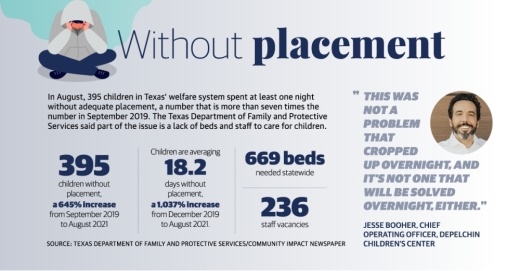According to DFPS officials, individuals in the state’s foster care system receive a “child without placement” designation, or CWOP, when the state cannot find a suitable and safe placement for that child, requiring the DFPS to provide temporary emergency care until a placement can be secured.
Texas Gov. Greg Abbott approved the creation of the expert panel in October to analyze the rising number of foster care children in CWOP. The development was part of a lawsuit—M.D. V. Abbott—that was initially filed in March 2011. The lawsuit culminated in 2015 after U.S. District Judge Janis Graham Jack ruled that foster children in Texas “almost uniformly leave state custody more damaged than when they entered.”
Over the last two years, the state has increasingly relied on unlicensed placements—often motels or office buildings—overseen by caseworkers. In October 2019, 32 children were in such placements statewide, according to DFPS data. By August 2021, that number had risen to 395 children.
While that number had dropped to 236 by November 2021, the expert panel issued a report on Jan. 10 describing the state’s foster care system as “woefully inadequate.” After reviewing thousands of documents and interviewing stakeholders and children about their experiences with the system, the panel recommended the implementation of 23 short- and long-term solutions for the DFPS and HHSC to employ mostly within 30-90 days.
Recommendations, responses
Among the recommendations, panelists suggested the state strengthen its infrastructure; create positions to help the DFPS and HHSC better coordinate their efforts; invest in more services to keep children with relatives and kinship placements; enhance access to resources; create mobile crisis centers; and develop a statewide children's mental health system of care.
The DFPS and HHSC responded to the recommendations in a Feb. 11 joint court filing.
“HHSC and DFPS tender each of these responses voluntarily, in the spirit of collaboration,” the court filing stated. “All responses and timelines are expressly limited by and subject to the agencies’ statutory authority and available funds. Specific items may require legislative action or relevant appropriations for implementation.”
While HHSC and DFPS officials committed to implementing most of the panel's recommendations within the allotted timeframe, several of the initiatives—including the statewide expansion of mental health services for children—did not have concrete timelines.
Paul Yetter, lead attorney in the M.D. V. Abbott case, said he believed the state’s response was not enough to fix the foster care system’s ongoing problems.
“We appreciate the state’s commitment to work with us, and the court monitors to rebuild and strengthen this broken system,” Yetter said in a Feb. 14 statement. “The state agencies’ pledge to collaborate with us and with each other could make a real difference for the children. That said, the state’s response falls far short. It fails to promise some of the most critical system changes needed by these vulnerable children, including efforts to improve kinship care operations.”
According to the HHSC and DFPS joint court filing, DFPS officials are implementing the panel’s recommendation to increase the use of and support for kinship care. Officials noted that while the DFPS is in the process of implementing these improvements, no timeline was issued concerning when they would be employed.
Further, Yetter said he believed the state should provide HHSC and DFPS with the additional funding needed to implement the panel’s recommendations.
“The state should do whatever it takes, including exploring the use of the state’s significant surplus funds, to increase funding for kinship care, and secure funding and resources to capitalize on the promise of the mental health programs identified by the expert panel,” Yetter said. “It is in everyone's interest, at the state and local level, to solve this crisis for Texas children.”
Kate Murphy, senior policy associate for child protection at nonprofit Texans Care for Children, touted the HHSC and DFPS’ response to the recommendations.
“It’s great to see that state leadership is embracing this road map for protecting kids from more abuse, helping children in foster care live with families, and giving kids in foster care the support they need to grow up healthy,” Murphy said in a Feb. 14 news release. “We urge state leaders to swiftly implement these recommendations to make sure Texas kids aren’t stuck living in a CPS office, a motel, a dangerous unlicensed home, or a foster care facility hundreds of miles away in another state.”
Murphy added that it was critical for Abbott and the Texas Legislature to move forward now on the panel’s recommendations, including pooling funding across agencies to ensure trauma-informed services and supports for families are quickly accessible, rather than wait for the 2023 legislative session.





